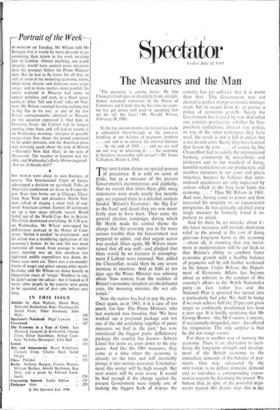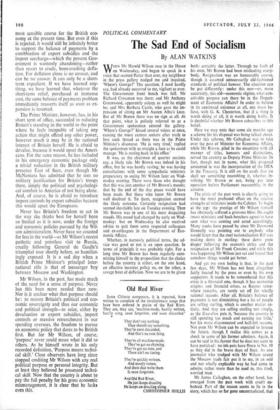The Measures and the Man
`The economy is getting better. He [the Chancellor] will give an absolutely frank, straight, honest statement tomorrow in the House of Commons and I think that by this time the coun- try has got pretty well used to accepting that we do tell the facts.'—Mr Harold Wilson, February 28, 1966.
'In the last sixteen months the nation has made a substantial breakthrough in the post-war handling of our balance of payments problem . . . our aim is to achieve the external balance . . . by the end of 1966 . . . and we are well on our way to achieving it . . . the economy is therefore reasonably well poised.'—Mr James Callaghan, March 1, 1966.
rr HE SPECTATOR claims no special powers 1 of prescience. It is with no sense of pride, but as a measure of the present Government's incompetence and duplicity, that we record that when these glib, smug statements were made nearly five months ago, we exposed them in a detailed analysis headed 'Britain's Economy: the Big Lie' as the fraud and deceit they are now mani- festly seen to have been. Then came the general election campaign, during which Mr Heath made his central theme the charge that the economy was in far more serious trouble than the Government was prepared to admit, and that urgent action was needed. Once again, Mr Wilson main- tained that all was well—and pledged that there would be no increase in unemploy- ment if Labour were returned. Nor, added the Chancellor, would there be any severe increase in taxation. And as little as ten days ago the Prime Minister was whining about 'how remote from the realities of Britain's economic situation are the defeatist cries, the moaning minnies, the wet edi- torials.'
Now the nation has had to pay the price. Once again, as in 1961, it is a case of too much, too late. The Prime Minister, who last weekend was boasting that 'We have worked out a prepared package and not one of the old scratching together of panic measures we had in the past,' has now introduced the biggest panic deflationary package the country has known—Selwyn Lloyd but more so, even down to the pay pause. And like the 1961 measures, they come at a time when the economy is already on the turn and will inevitably plunge it into serious recession. Unemploy- ment this winter will be high enough. But next winter will be even worse. It would be bad enough if the charge against the present Government were simply one of making the biggest hash of stop-go the country has yet suffered. But it is worse than that. This Government was not elected to perfect stop-go economic manage- ment, but to escape from it: to pursue a policy of economic growth. 'Surely the Government has learned by now that when one restricts production, whether by hire- purchase restrictions, interest rate policy, or any of the other techniques they have used, the result is not a fall in prices but a rise in unit costs. Surely they have learned that lesson by now . . . of course he [the Chancellor] had to satisfy the international banking community by masochistic and irrelevant cuts in our standard of living, harmful restrictions on our production, and needless increases in our costs and prices structure, because he believes that inter- national speculators are only impressed by actions which in the long term harm the economy. . . .' Thus Mr Wilson in 1961. And now, having come to power and then increased his majority on an expansionist prospectus, he has cynically adopted every single measure he formerly found it ex- pedient to attack.
And let there be no mistake about it: the latest measures will provide short-term relief to the pound at the cost of doing grievous long-term harm to the economy —above all, in ensuring that any invest- ment in modernisation will be cut back so that Britain's ability to combine faster economic growth with a healthy balance of payments will be still further weakened in the future. Under Wilson, the Depart- ment of Economic Affairs has become about as relevant to the conduct of this country's affairs as the Welsh Nationalist party—in fact, rather less—and the National Plan it spawned has turned into a particularly bad joke. We shall be lucky if we even achieve half the 25 per cent gross target so confidently proclaimed less than a year ago. It is hardly surprising that Mr George Brown—like Mr Cousins, a sincere, if occasionally misguided, man—has offered his resignation. The only surprise is that he did not resign sooner.
For there is another way of running the economy. There is an alternative to sacri- ficing the long-term strength and develop- ment of the British economy to the immediate demands of the balance of pay- ments. One way, advocated by the SPECTATOR, is to deflate domestic demand and to introduce a corresponding expan- sion in exports by devaluing the pound. We believe that, in spite of the powerful argu- ments against this drastic step, this is the most sensible course for the British eco- nomy at the present time. But even if this is rejected, it would still be infinitely better to support the balance of payments by a combination of export subsidies and the import surcharge—which the present Gov- ernment is wantonly abandoning—rather than resort to crude, bone-crushing defla- tion. For deflation alone is no answer, and can be no answer. It can only be a short- term expedient. If we have learned any- thing, we have learned that, whatever the short-term relief, purchased at immense cost, the same balance of payments problem immediately reasserts itself as soon as ex- pansion is resumed.
The Prime Minister, however, has, in his short term of office, succeeded in reducing Britain's standing in the world to the point where he feels incapable of taking any action that might offend any other power, however much it may be in the national interest of Britain herself. He is afraid to devalue, because it would upset the Ameri- cans. For the same reason, he has included in his emergency economic package only a trivial reduction in the British military presence East of Suez, even though Mr McNamara has admitted that he sees no military justification for Britain's troops there, simply the political and psychologi- cal comfort to America of not being alone. And, of course, he is afraid to introduce import controls by export subsidies because this would upset the Europeans.
Never has Britain's freedom to act in the way she thinks best for herself been so limited as it is now, under the foreign and economic policies pursued by the Wil- son administration. Never have we counted for less in the world—as Mr Wilson's recent pathetic and pointless visit to Russia, cruelly following General de Gaulle's triumphal tour shortly before, so humiliat- ingly exposed. It is a sad day when a British Prime Minister's principal inter- national role is that of messenger boy between Moscow and Washington.
Mr Wilson, in the past, has made much of the need for a sense of purpose. Never has this been more needed than now. Nor is it unclear what that purpose should be: to restore Britain's political and eco- nomic sovereignty and thus our economic and political strength—to seize, either by devaluation or export subsidies, import controls or massive retrenchment in our spending overseas, the freedom to pursue an economic policy that dares to be British first. But for Mr Wilson, of course, `purpose' never could mean what it did to others. As he himself wrote in his only recorded definition, 'Purpose means techni- cal skill.' Close observers have long since stopped crediting Mr Wilson with any real political purpose or personal integrity. But at least they believed he possessed techni- cal skill. Now that the country is about to pay the full penalty for his gross economic mismanagement, it is clear that he lacks even this.







































 Previous page
Previous page